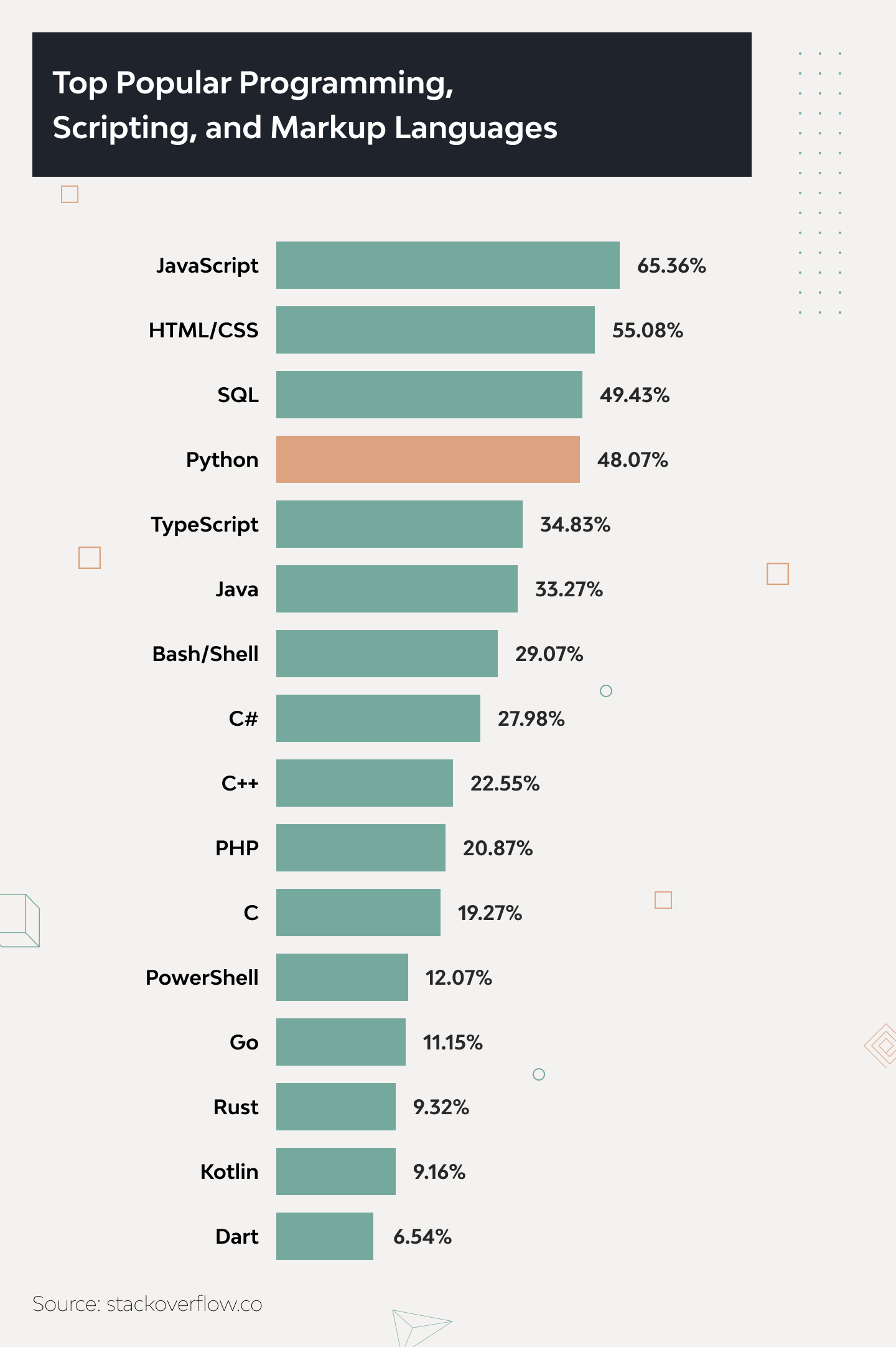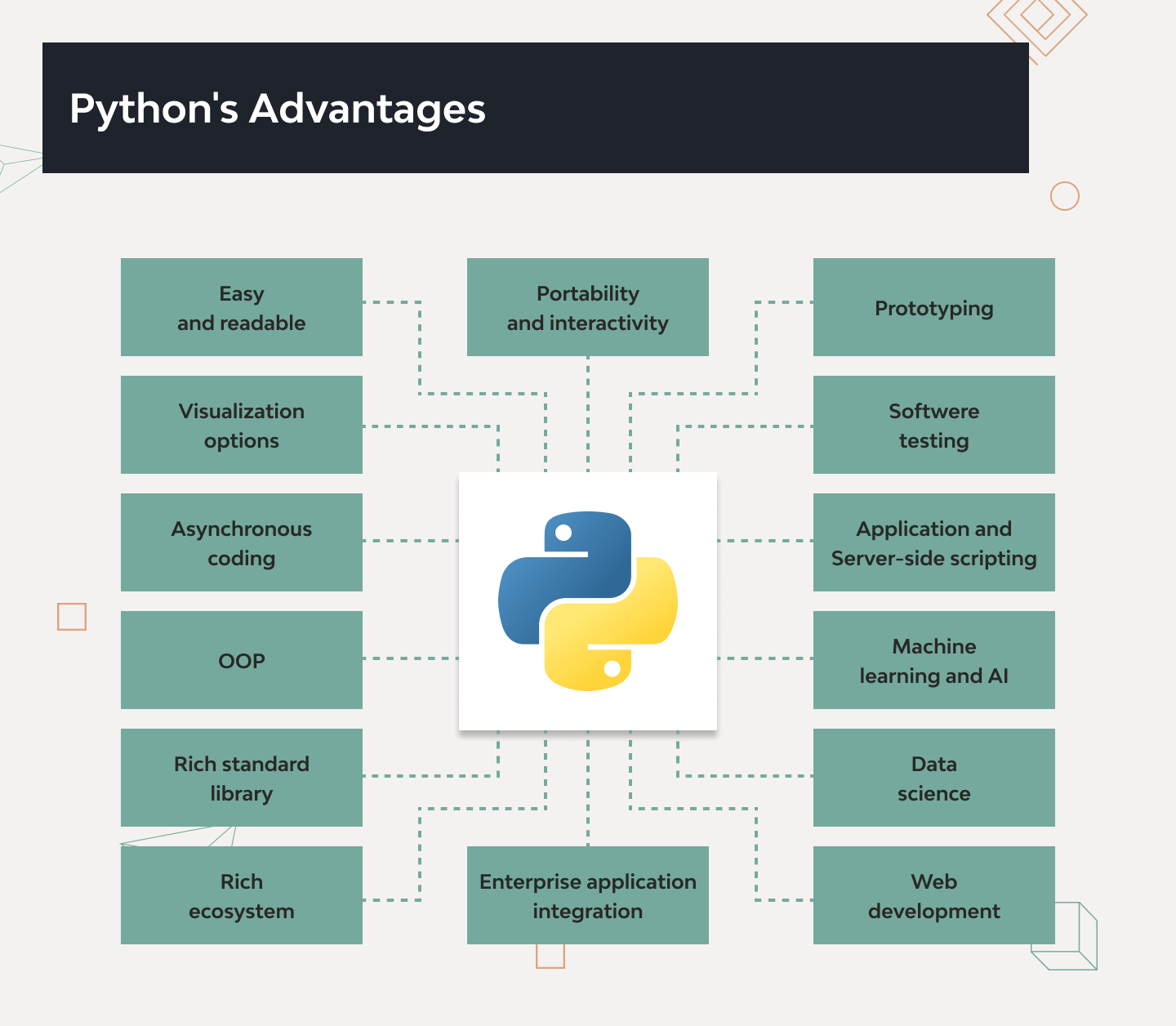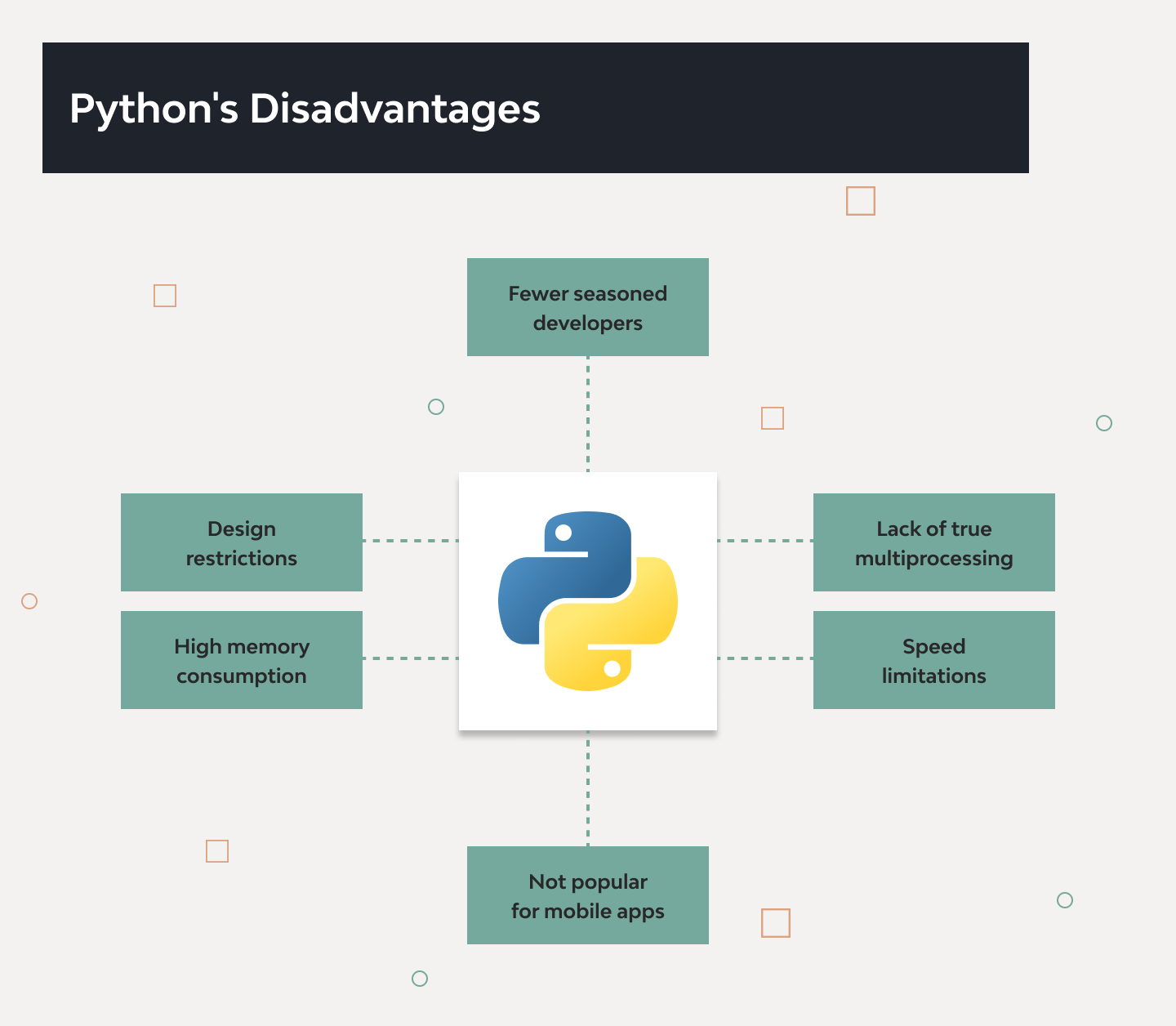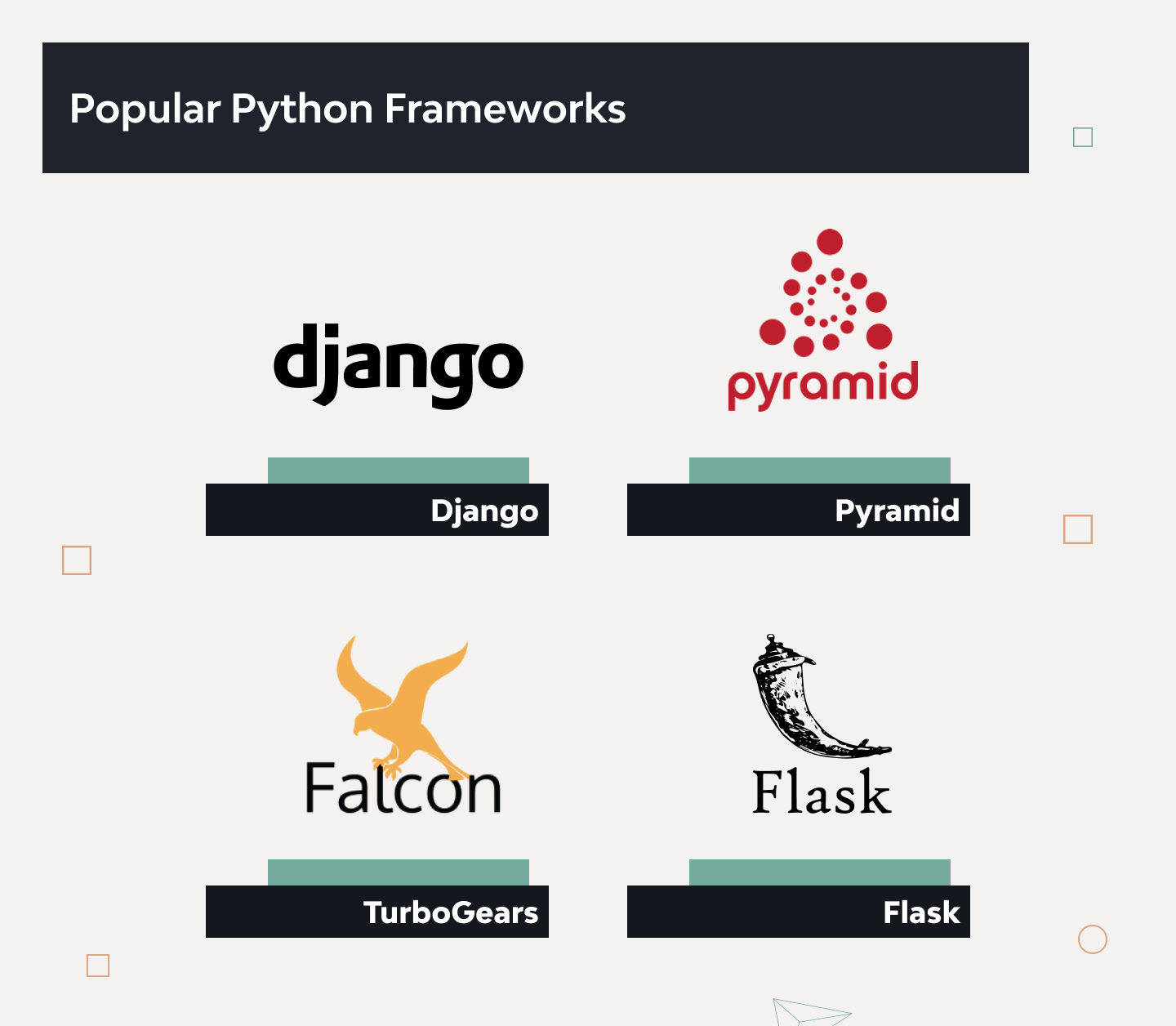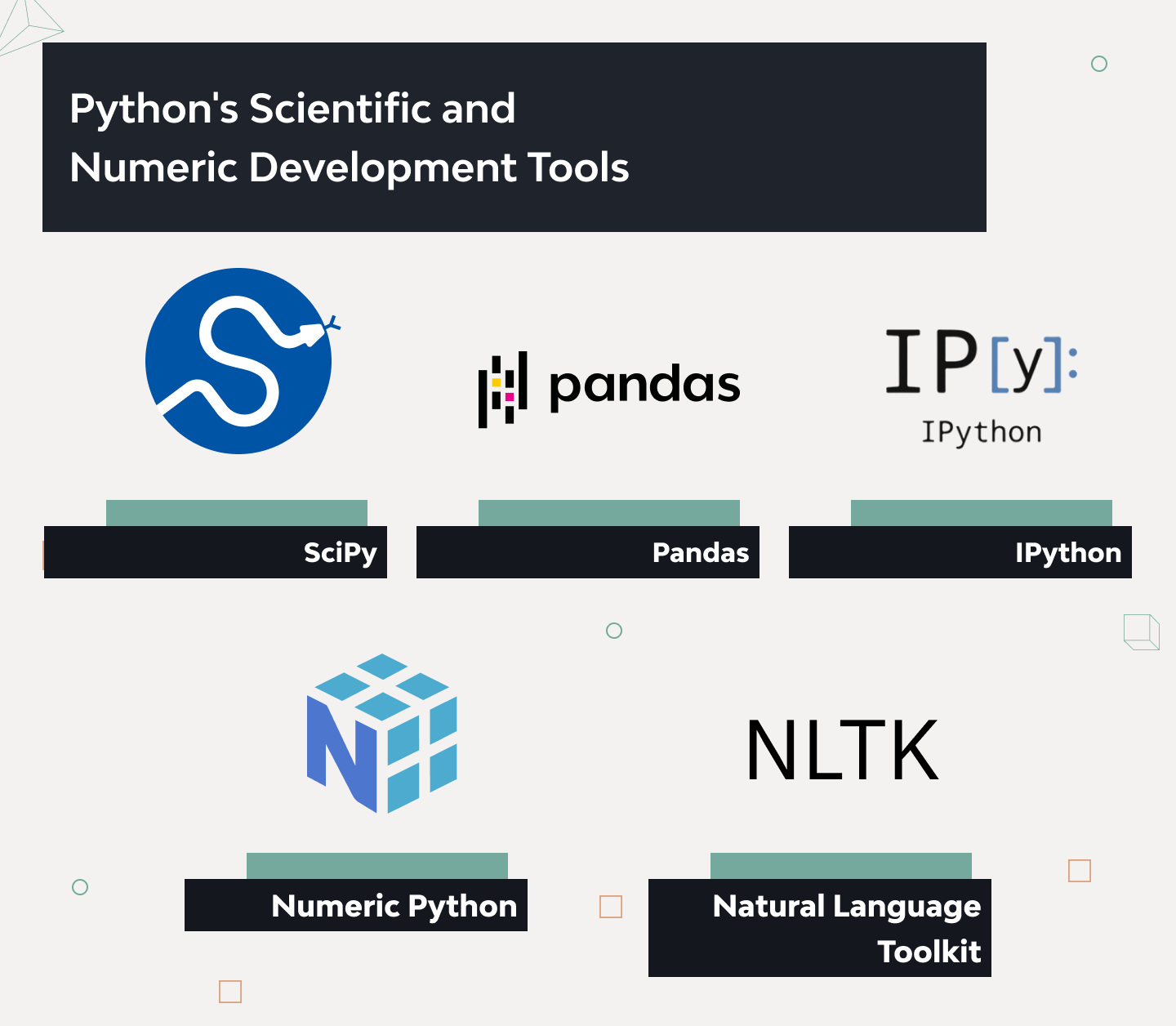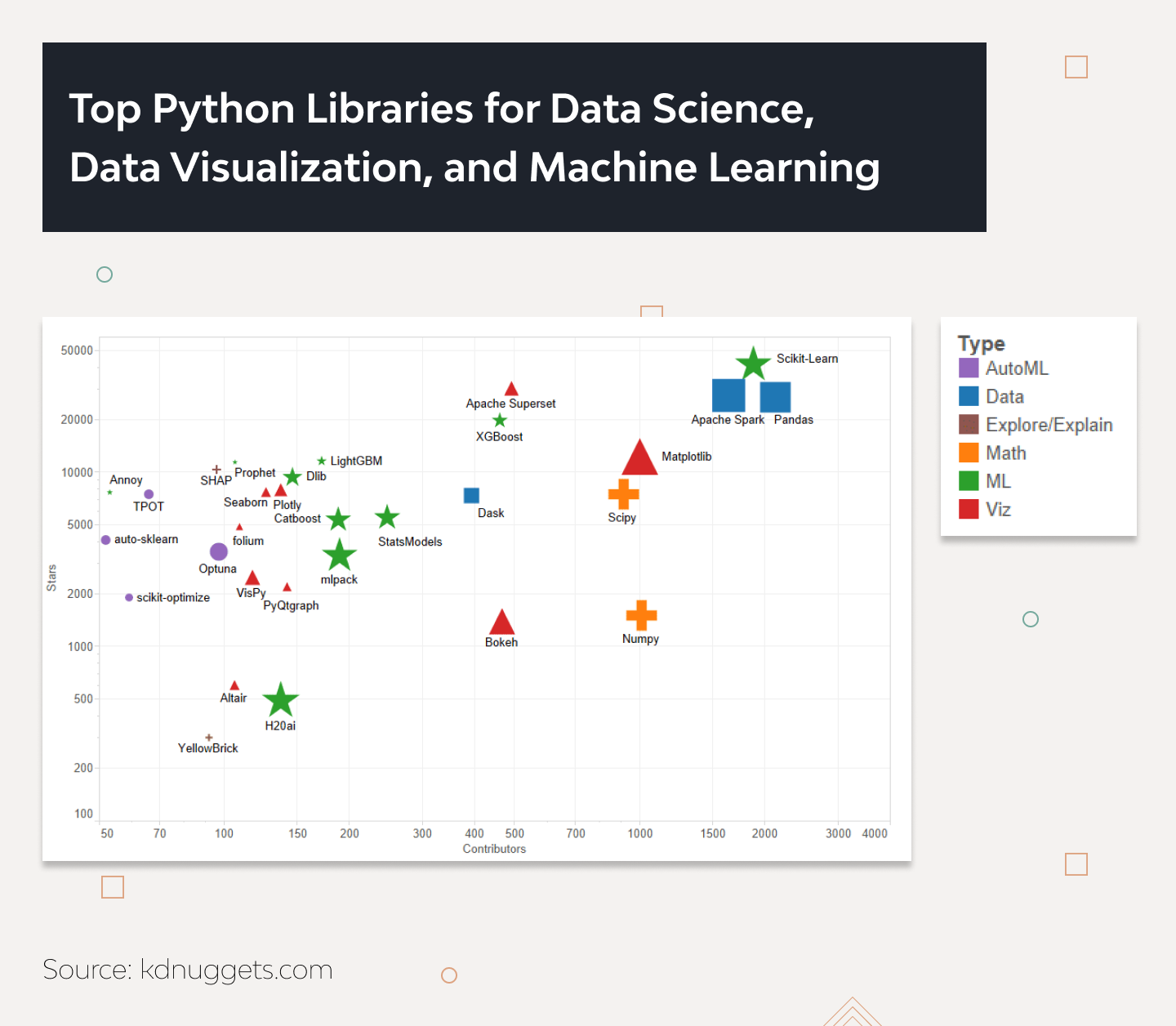Python for Web Development: A Full Guide
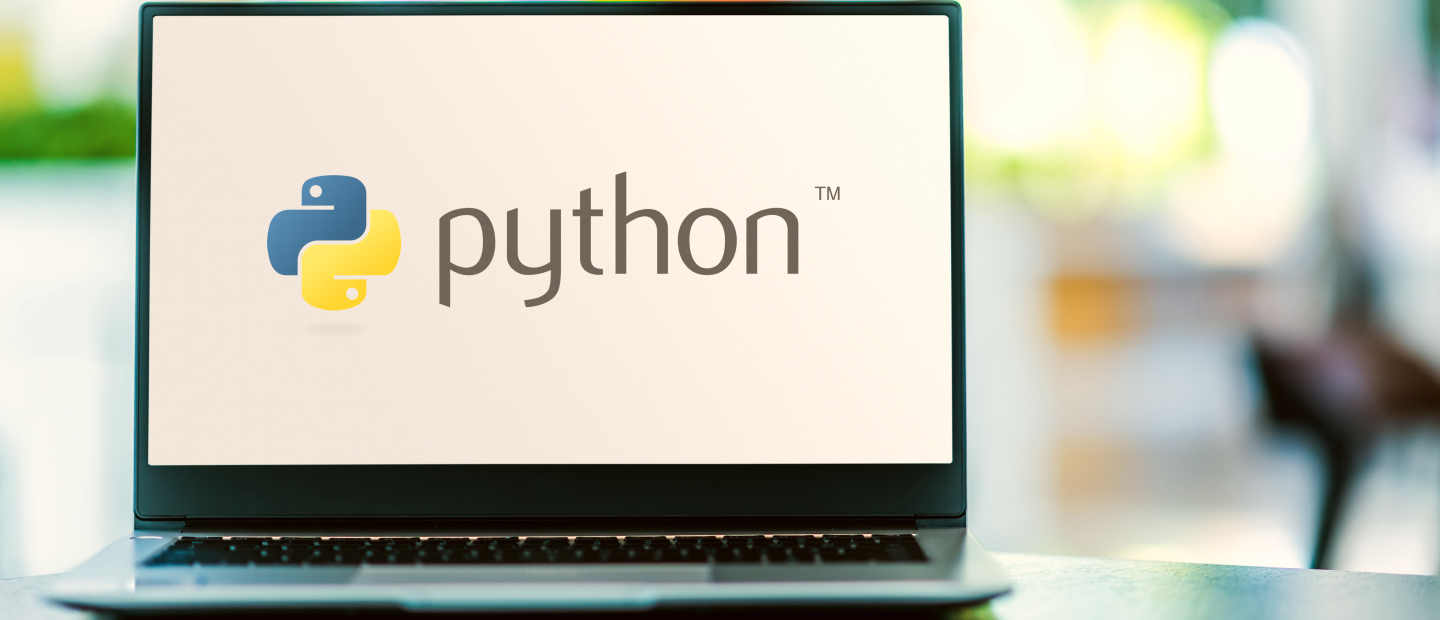
Listen to “The 16 Most Important Pros and Cons of using Python for Web Development” on Spreaker.
Are Python development services right for your web project? If you are wondering about this, you can look at examples of what has already been developed with it. This will bring some perspective to the topic before going into pros and cons of using Python.
Did you know that Python was named after Monty Python?
One of the world’s most popular coding languages for web development, Python was first conceptualized in the late ’80s, influenced by the ABC and Modula-3 languages. It has come a long way from its first release in 1991 to the 2.0 release when it became an open-source project, and to this day it is gathering a huge, professional community that is constantly improving the technology.
Some of the top companies use Python in their technology stacks:
- Instagram — a social media platform that relies on Python to allow its 500 mil daily active users to photograph, edit, store, and share their creations in a person digital album.
- Spotify — a major market player and a music streaming app that incorporates data analytics to manage its Radio and Discover features.
- Disqus — this commenting plugin processes around 50 mil comments per month, and it is available in 191 countries.
Python web development suits a variety of projects, from simple to complex. It is widely used in different spheres such as travel, healthcare, transportation, finance, and many others for web development and software testing, scripting, and generation.
Our company has been one of the leaders in the use of Python for web development for the past 16 years. We implemented more than a dozen projects and filled our portfolio precisely thanks to the use of this programming language.
However, while there are many advantages to using Python for web development, there are also a few pitfalls. Let’s check pros and cons of Python in web development.
What is Python Web Development?
Python website development offers an efficient way to build fast, scalable, and maintainable web applications using a language known for its simplicity and flexibility. Well-established Python web development frameworks support a wide range of projects—from lightweight websites to complex, enterprise-grade platforms.
Wondering, can you use Python for web development? Absolutely. Its readable syntax, combined with a rich ecosystem of tools, enables developers to create robust solutions quickly and reliably. That’s why it’s a popular choice for everything from MVPs to large-scale digital products.
Why Use Python for Web Development
Choosing the right tech stack means weighing performance, scalability, and development speed. So, is Python good for web development? This section breaks down the real advantages—like clean syntax and mature frameworks—alongside the trade-offs, so you can make an informed decision.
Is Python Good for Web Development?
Yes — Python is an excellent choice for web development, particularly for scalable, data-intensive, or backend-heavy applications. Its mature ecosystem (Django, FastAPI), strong security practices, and readability make it a top pick for teams that value development speed without compromising code quality or long-term maintainability.
Easy to Use and Read
There are several factors that make web development with Python more straightforward and efficient:
- Low entry barrier
Python is similar to the English language we use in everyday life. The simplicity of the syntax allows you to deal with intricate systems and ensure that all the elements have a clear relationship with each other. Thanks to this, more newbie coders can learn the language and join the programming community faster. - Good visualizations
Representing data in a format that can be easily understood is achieved using different plots and charts. They are an efficient way to visually present and comprehend data. Web development companies utilize Python libraries (e.g., Matplotlib) that make it possible to visualize data and create clear and easy-to-understand reports.
Why choose web development with Python as your go-to solution? It’s incredibly easy to read, so developers typically have no problems understanding code written by their fellow programmers. This makes the communication between developers working on the same project much more efficient. And a great selection of IDEs for Python development makes web programming even more comfortable. You can even create a Telegram Bot by using Python.
Asynchronous Coding
Mastering web development with Python offers seamless management of asynchronous code. Python eliminates deadlocks and research contention, ensuring smooth execution. Its ability to handle diverse situations independently accelerates problem-solving. This proficiency makes Python in web development an optimal choice for companies aiming to expedite their product creation.
Less-Limited Programming Approach
Compared to other coding languages, such as Java, Python has a less-limited programming approach. It has multiple paradigms and can support a multitude of programming styles, including procedural, object-oriented, and functional ones. This makes it a great language for MVP development services for startups, highlighting why Python is good for web development—it offers the flexibility to adapt your approach whenever needed.
Here’s what it gives you:
- Fast development.
Python is not just one of the most rapidly developing coding languages, but also one that allows for quick prototyping and iterations. This makes the work easier and far more productive for developers. This also makes Python a great language for startups, as often faster time to market means greater competitive advantage. - OOP becomes easier.
Object-oriented programming, also known as OOP, is a paradigm that organizes different behaviors and properties into several objects and classes. Each of these classes has a function, so if an error occurs in some part of the code, the other parts are not affected. The operation of OOP is considerably simplified in Python, which makes development less costly and time-consuming. - Rich standard library and ecosystem.
Python’s libraries feature a huge amount of pre-written code. Hence, developers don’t need to waste time creating basic items. These libraries also allow programmers to handle and transform the data required for continuous data processing in Machine Learning (ML).
Enterprise Application Integration
Python is a popular choice for enterprise software applications, largely thanks to its smooth integration with other languages traditionally used in enterprise development, such as Java, PHP, and .NET.
Python calls from and to Java, C++ or C code directly allowing considerable process control and implementation of the most common protocols and data formats.
Apart from this, it can be applied to assembling new and old fragments of infrastructure, which is a typical case in complex mobile applications.
The Cons of Python for Web Development
Some of you might be wondering, “If it’s so popular, why do some developers hesitate to choose Python web development?”. Despite Python’s advantages, it also has downsides you should keep in mind if you’re considering using this language for your project.
Fewer Seasoned Developers
When you need to have an app created for you, you certainly want the most experienced developers to do the job. However, it’s not so simple with Python, since not many expert programmers are working with this language, especially when you compare it to Java.
Lack of True Multiprocessor Support
Multiprocessing is an important part of writing an application. Python does support multiprocessing, although it might not be as flexible or convenient as other languages. This can create certain limitations when you’re writing the code.
Speed Limitations
Python is often criticized for its speed. It is an interpreted script language, which makes it relatively slower than a lot of its compiled counterparts, such as C/C++ or Java, due to the different methods it uses to translate code. Yet, some Python benchmarks work faster than those of C and C++.
That being said, Python is not the only one with potential speed problems. Ruby, Perl, and even JavaScript are on the slower end of the scale as well.
Some issues connected to Python code performance have been addressed and optimized, so Python remains one of the top choices of software development teams.
Not the Go-To Language for Mobile App Development
It’s not a bad language for mobile development. It’s just that few companies use it for that purpose, preferring native development for iOS and Android or React Native development. You’ll probably have a hard time recruiting developers with experience in Python mobile development, too, for the same reason. It’s just not as popular as other technologies in this sphere.
Not Ideal for Memory-Intensive Tasks
Python is a language known for the flexibility of its data types. This results in fairly high memory consumption and makes it inconvenient to use for memory-intensive tasks.
Design Restrictions
Python is dynamically typed, meaning that it executes certain tasks during app runtime that would otherwise be completed in a statically typed language. This puts some restrictions on the design. If your design is loaded with elements, it might stall the program and prevent smooth operation.
Another thing you should be aware of when considering Python for your project is that concurrency and parallelism aren’t intended for elegant use in Python. Because of that, the design might not look as sophisticated as you’d like.
How to Use Python for Web Development
It’s one of the most popular languages today, and to understand why, it helps to explore how is Python used in web development—from backend development to automation and API integrations. For 1.4% of websites worldwide, Python is the primary server-side programming language, but about 20% more use Python for scripts and extensions, connecting with 3PL, data parsing, and working with databases.
Here is a step-by-step guide to how to start web programming with Python:
1. Install Python and choose a web framework
It’s simple: download the latest Python version from the official website. For web development, we strongly recommend using one of the following frameworks: Django, Flask, Pyramid, or Bottle. In Django Stars, we usually use Django. Don’t forget to install the framework you’ve chosen. For example, if you work with Django, run “pip install Django.”
2. Set up the environment and start a new project
Create a separate folder for your project and activate the chosen framework. For Django, you can do it with the “django-admin startproject projectname” command.
3. Configure your settings
Python frameworks have particular configuration files where you can specify database settings, security options, and other staff. Still, these settings may not be intuitive for new users, so we recommend professional help.
4. Specify the logic of your website
Use the Views tool to design the response form and Templates to create a solid structure of web pages. Adding lots of involving activities and tools on the website is crucial.
5. Define URL routes
In most cases, they are provided by the framework you choose, but we recommend checking it.
6. Connect databases
Python is perfect for working with SQL and NoSQL databases, but it requires some skills and experience, especially in the early stages of project development.
7. Customize a sales funnel
All previous actions serve a single target — to make a project profitable. So, pay additional attention to key features aimed at generating income, including payment options.
8. Test and deploy
Even small web projects are impossible without bugs, so testing is an essential stage of website development. Ensure everything works as intended. Twice. After that, you may deploy your application on the server and open it publicly.
Python web programming has become a natural fit for modern web development, thanks to its simplicity, flexibility, and powerful frameworks. Its numerous frameworks and libraries allow the design of multi-purpose websites. But if you want to use all of its might, contact us. We will help you realize all your website’s potential in Python.
Popular Python Web Development Framework
Another good thing about web development using Python is that it has many frameworks that simplify the development process. Depending on what you’re doing, you may need different frameworks.
Let’s take a look at the most well-known Python frameworks.
- Django
This framework is great for fully-fledged web apps and mid-range scalable projects. It has built-in features and allows for code re-usage, coherent modification of different components of the code, and other functionality that simplifies web development in Python. Django works well with Oracle SQL, PostgreSQL, MySQL, and other well-known databases. Find out the best Django websites. - Pyramid
With this framework, you can start small and scale if needed. Pyramid can be used with various databases and applications or extended with plugins — python web developers can add whatever functionality they need. That’s handy when you need to implement various solutions in one task. - TurboGears
TurboGears consists of several components such as Repoze, WebOb, and Genshi, and is based on the MVC architecture. It’s good for fast and efficient web application development, which is also more maintainable. With this framework, you can write small or complex applications using minimal or full-stack modes respectively. - Flask
This framework’s philosophy is to provide a simple and manageable solution that can be easily customized. Flask defines itself as a microframework and is most commonly applied to small solutions whose main priority is lean functionality. The framework is also used for creating prototypes.
Its Use In Scientific and Numeric Applications
There are a variety of packages and libraries available for developing scientific and numeric applications, as well as toolkits (e.g., VTK 3D and MayaVi), a separate imaging library, and many other tools. The most common usage of Python in web development are:
- SciPy (Scientific Numeric Library);
- Pandas (Data Analytics Library);
- IPython (Command Shell);
- Numeric Python (Fundamental Numeric Package);
- Natural Language Toolkit (Library For Mathematical And Text Analysis).
Use In Machine Learning and AI
Machine learning (ML) and artificial intelligence (AI) technologies are gaining increasingly more attention, so more developers are trying to incorporate them into various projects. This is possible if you use the right language. Using Python with web development, you open up wide opportunities for using machine learning and artificial intelligence tools.
According to Jean Francois Puget, a representative of IBM’s machine learning department, Python is the top language for ML and AI projects, and many developers agree. Python has efficient ML packages, tools for visualizing results, and goes way beyond data analysis and other features that benefit this area of application.
Application Scripting and Software Testing
Thanks to its strong integration with C, C++, and Java, Python can come in handy for application scripting. Designed to be embeddable from the very beginning, it can be very useful for customizing large apps and making extensions for them.
What is Python used for in web development and beyond? One more answer: test automation. Many QA automation specialists choose Python for its simple learning curve – it’s also great for those with a more limited technical background – strong community, clear syntax, and readability. Python even has an easy-to-use unit-testing frameworks (e.g., you can perform geolocation testing for mobile applications with it).
Can Python Be Used for Web Development?
Yes — Python is not only suitable for web development, it’s a preferred choice for complex, scalable products, especially in industries like fintech, healthtech, and SaaS. It powers everything from real-time dashboards to payment platforms and AI-driven apps.
Why? Python combines clean, maintainable code with powerful web frameworks like Django and FastAPI. It accelerates development without sacrificing performance or security — which is exactly why companies building data-driven or compliance-sensitive products often choose it over trendier stacks.
Use in Prototyping
Creating prototypes in Python has proven to be a fast and simple process. The agility of the programming language allows for easy code refactoring and quick development of the initial prototype into the final product.
Open-Source Perks
Python has an open-source license that makes it easily accessible to users and facilitates redistribution and unrestricted modifications. Developers can freely use the language and contribute to its improvement.
Server-Side Scripting
One of the pros of using Python for server-side scripting is its simple syntax, as mentioned above, which speeds up the process significantly. The code consists of functional modules and connections between them, which allows you to execute the program algorithm based on user actions. Python also supports the graphical user interfaces required in web development.
Portability and Interactivity
Python has decent capabilities for dynamic semantics and fast prototyping, which is possible thanks to its interactivity and portability. It can easily be embedded in a wide range of apps, even ones that use different coding languages. Consequently, you can effortlessly fix new modules and extend Python’s core vocabulary. It can connect diverse components. No wonder it’s sometimes called a “glue language”.
Python Libraries for Web Development
Python’s dominance in web development isn’t just because of its clean syntax—it’s the ecosystem of powerful libraries and frameworks that make it a go-to for everything from lean APIs to full-stack platforms. Whether you’re scaling microservices or architecting enterprise apps, these tools offer flexibility, performance, and control where it matters.
Here are 10 standout libraries every serious Python web developer should know:
-
Django – not just a framework—it’s a full-stack powerhouse. Django handles everything from authentication to ORM to admin dashboards, letting you build robust applications fast without reinventing the wheel.
-
Flask- minimalistic but mighty. Flask gives you the core essentials for web apps while leaving architecture decisions up to you—perfect for custom solutions and rapid prototyping.
-
FastAPI- designed for modern APIs, FastAPI combines speed, automatic OpenAPI docs, and Python type hints to deliver production-ready endpoints with minimal code—and maximum performance.
-
Tornado- built for speed and concurrency, Tornado shines in real-time use cases like chat apps and live dashboards. If your app needs non-blocking I/O at scale, this is your tool.
-
Bottle- a one-file microframework that’s surprisingly powerful. Ideal for lightweight apps, embedded systems, or when you want zero external dependencies.
-
Pyramid- think of it as the “choose-your-own-adventure” framework. Pyramid is unopinionated and flexible, letting you plug in your preferred tools while still providing enterprise-grade scaffolding.
-
Requests- the gold standard for making HTTP requests in Python. Clean syntax, solid reliability, and extensive features make it a no-brainer for integrating APIs or web scraping.
-
SQLAlchemy- more than just an ORM—SQLAlchemy gives you full control over your database logic, whether you prefer raw SQL or elegant ORM abstractions. It’s the backbone of many serious Python apps.
-
Jinja2- this fast and expressive templating engine powers HTML generation in Flask and other frameworks. It brings logic and reusability to your front-end without cluttering your Python code.
-
WTForms- form handling done right. With built-in validation, CSRF protection, and flexible rendering, WTForms makes user input secure and painless to work with.
Core Components of Python Web Development
Modern web development with Python isn’t just about choosing the right framework—it’s about mastering the core components that power scalable, secure, and maintainable applications. From request handling to deployment, understanding these building blocks is essential for developing production-ready systems.
Routing
The logic that maps URLs to your code. Efficient routing systems handle everything from simple endpoints to dynamic URL patterns, powering clean, RESTful APIs and structured web apps.
Templating
Converts your data into dynamic HTML. Python uses templating engines like Jinja2 to render frontend views, enabling clean separation between logic and presentation.
Database Integration
Whether using ORMs like SQLAlchemy or direct SQL queries, integrating with databases allows your application to store, query, and manage persistent data with structure and security.
Middleware and Extensions
Middleware acts as a pipeline for processing requests and responses, while extensions enhance functionality—handling everything from authentication to CORS, without bloating your core logic.
Testing
Automated tests ensure stability and catch regressions before deployment. Python’s unittest, pytest, and framework-specific tools help validate routing, views, and backend logic efficiently.
Deployment
Moving from development to production requires containerization (Docker), process managers (Gunicorn), and cloud readiness. Python web apps scale best when deployed with reliability and monitoring in mind.
How to Create a Web Application in Python (Step-by-Step)
Building a web application in Python involves more than writing code—it requires thoughtful planning, clean architecture, and the right tooling. Below is a streamlined, high-level workflow that outlines the key phases of professional web app development in Python.
-
Define the Project Scope and Requirements
Identify the core features, user flows, and technical requirements. This ensures your tech stack, architecture, and development plan align with the product’s goals. -
Set Up the Development Environment
Configure your Python environment using tools likevenvorPoetry, set up version control (e.g., Git), and choose your framework (e.g., Flask, Django, FastAPI) based on the project’s complexity. -
Design the Application Structure
Establish a modular codebase with clear separation of concerns: routes, models, templates, and services. Follow best practices like MVC or layered architecture to ensure maintainability. -
Implement Routing and Core Functionality
Build out route handlers, define endpoints, and connect them to backend logic. Ensure URL design is clean and RESTful where appropriate. -
Integrate Database and Business Logic
Set up your database schema using an ORM like SQLAlchemy or Django ORM. Implement business logic to interact with data models securely and efficiently. -
Add Templating and Frontend Components
Use templating engines (e.g., Jinja2) to render dynamic views, or integrate a frontend framework if building a SPA. Ensure frontend/backend communication is seamless. -
Test, Debug, and Deploy
Write unit and integration tests to validate functionality. Use tools likepytest, configure error handling, and deploy using services like Heroku, AWS, or Dockerized infrastructure.
Python Web Development Best Practices
Building reliable, secure, and scalable web applications in Python requires more than writing functional code—it demands disciplined development practices. The following best practices are fundamental to professional-grade Python web projects and help ensure long-term maintainability and performance.
-
Follow a Consistent Project Structure
Organize your codebase with clear separation of concerns—group routes, models, templates, and services into logical modules. This improves readability, scalability, and team collaboration. -
Use Virtual Environments and Dependency Management
Always isolate your project’s dependencies with tools likevenv,virtualenv, orPoetry. Track them in arequirements.txtorpyproject.tomlto ensure reproducibility across environments. -
Implement Secure Coding Practices
Sanitize all user input, use parameterized queries to prevent SQL injection, and manage secrets with environment variables or tools likepython-decouple. Always stay updated on security patches for libraries and frameworks. -
Write Automated Tests
Usepytestorunittestto build a comprehensive test suite covering unit, integration, and functional tests. Automation ensures confidence during refactoring and prevents regressions in production. -
Use Configuration Files and Environment Separation
Keep configuration (e.g., database URLs, debug flags) out of your source code by externalizing settings per environment (dev, staging, production). Tools like.envfiles or environment-specific config modules are standard practice. -
Optimize for Performance and Maintainability
Use database indexing, caching (e.g., Redis), and asynchronous views where appropriate. Follow PEP8 for code style, document complex logic, and keep functions small and focused.
Closing Thoughts
Can Python be used for web development? This article was intended to provide a detailed answer to this question about using python in web development and describe the pros and cons of this programming language.
Python allows you to develop clear and simple applications that are easy to get from a small project to a full-fledged, complex app. Whether you’re a newbie programmer learning how to code or an owner of your business, Python can be a good option for many types of projects.
It’s recognized as one of the best programming languages for startups – and it’s easy to see why when you compare side-by-side Python’s advantages and what startups are all about. Startups are constantly searching for certainty and reduced risks, they have limited resources, and need room to grow. On the other hand, Python is flexible and easy to scale, doesn’t require a big team, and can be used to build prototypes and MVPs.
Additionally, Python’s compatibility with various testing frameworks, including enzyme unit testing, enhances its suitability for developing robust web applications.
Django Stars, a Python web development company, has been using the language for many years. We’ve completed various complex projects and have a number of successful examples in spheres such as e-commerce, real estate, and finance. These include:
- PADI Travel – e-commerce and travel booking platform used by divers from all over the world.
- Sindeo – a real estate platform that provides information on lenders and mortgages.
- MoneyPark – a Swiss company that provides personalized financial advice on insurance and mortgages.
So, whichever sphere you work in, web development in Python is worth your attention. It offers simple solutions without unnecessary details, saves time, and ensures a high level of security.
Python is used and trusted by many renowned companies. Some of the largest and most trusted global firms use Python as their main coding language, along with the Django platform. Instagram, Pinterest, Bitbucket, and Dropbox are a few examples of companies that go for Python-based web development services.
Сontact Django Stars if you are looking for an experienced Python development team for your project.
- Is Python web development hard?
- In web development, Python is known for its user-friendly nature, with clear syntax and robust frameworks like Django and Flask. This makes it a suitable choice for both beginners and experienced developers. The level of difficulty largely depends on the complexity of the project. Overall, Python offers an approachable and efficient environment for developing web applications.
- Can Python be used for front end web development?
- Python is predominantly used for back-end web development, but it can play a role in front-end development too. While frameworks like Django and Flask are typically for server-side tasks, they can manage and serve front-end content. Additionally, with technologies like WebAssembly and transpilers, Python code can be used or converted for browser execution, though these are less common practices compared to traditional front-end languages like JavaScript, HTML, and CSS.
- Is Python good for backend in web development?
- Having many advantages, from the ease of learning to a large number of frameworks that simplify the development process, Python is often used for backend web application development. In addition, Python is well-equipped to work with analytics, calculations, AI and ML, and statistics.
- Is Python the right fit for Mobile App Development?
- Although it is not as popular as other technologies in this sphere, Python is not a bad language for mobile development. It’s just that few companies use it for that purpose, preferring native development for iOS and Android or React Native development. You’ll probably have a hard time recruiting developers with experience in Python mobile development, too, for the same reason.
- Why does your company prefer to use Python in web development?
- Python is easy to use and read.
- It doesn’t take much effort to write and maintain asynchronous code using Python.
- Python's less-limited programming approach allows different paradigms and programming styles, including procedural, object-oriented, and functional ones.
- Python is a popular choice for enterprise software applications, largely thanks to its smooth integration with other languages such as Java, PHP, and .NET.
- To simplify the development process, Python has many frameworks such as Django, Pyramid, TurboGears, and Flask.
- There are a variety of packages and libraries available for developing scientific and numeric applications.
- Many developers agree that Python is the top language for ML and AI projects.
- Python is handy for application scripting, software testing, and creating prototypes.
- Python has an open-source license.
- Python's simple syntax speeds up server-side scripting.
- Python is distinguished by portability and interactivity.
- What are the weaknesses of Python?
- Fewer seasoned developers (especially comparing to Java)
- Lack of true multiprocessor support
- Python is often criticized for its speed (yet, some Python benchmarks work faster than those of C and C++)
- Not the go-to language for mobile app development
- Not ideal for memory-intensive Tasks
- Design restrictions
- In what industries do you use Python?
- Django Stars, a Python web development company, has been using the language for many years. We’ve completed various complex projects and have a number of successful examples in spheres such as e-commerce, real estate, and finance. These include:
- PADI Travel – a global booking platform for scuba drivers.
- Sindeo – a real estate platform that provides information on lenders and mortgages.
- MoneyPark – a Swiss company that provides personalized financial advice on insurance and mortgages.
- Molo - the UK's first digital mortgage lender.

